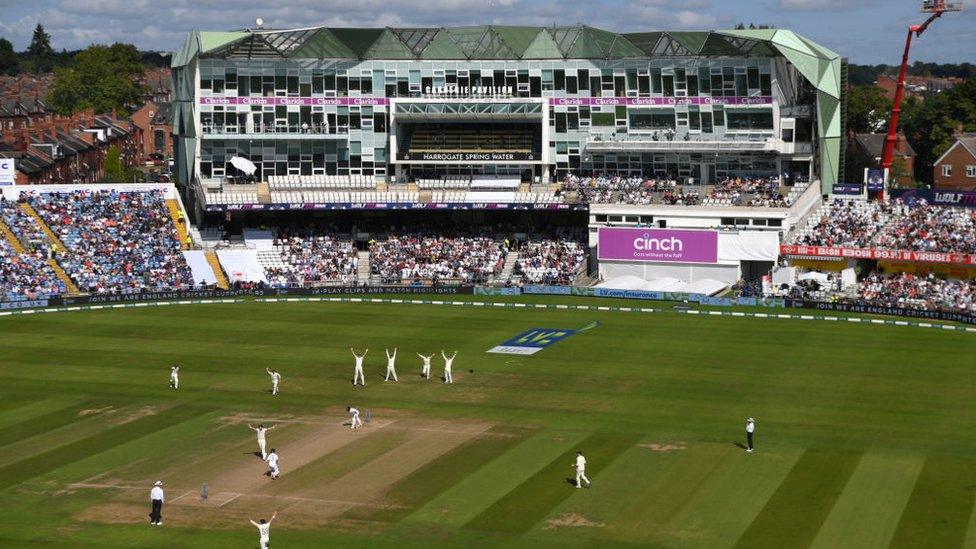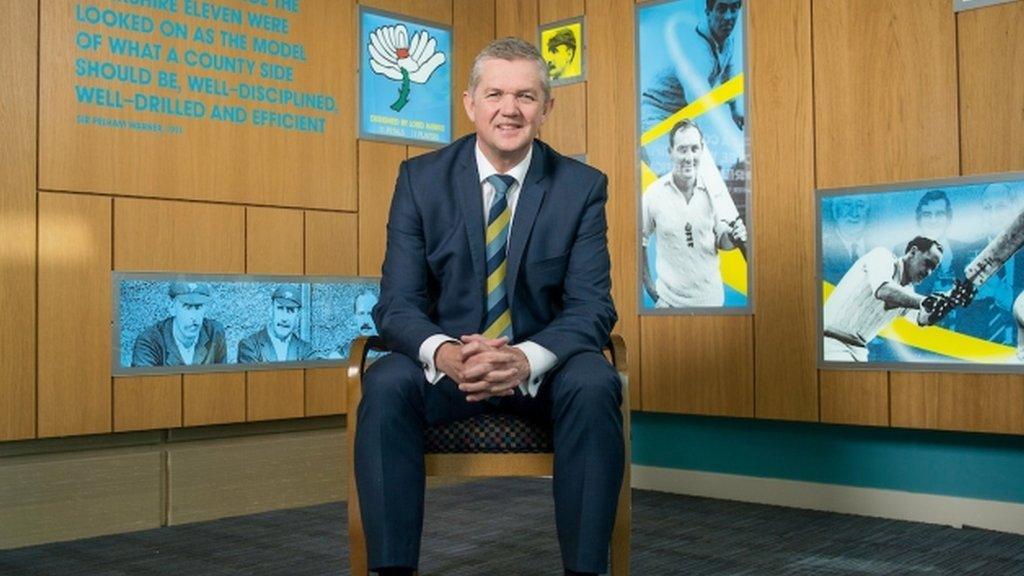Azeem Rafiq: What England's cricket racism scandal is all about
- Published
'It's important we don't let this moment go' - Azeem Rafiq speaks to BBC sports editor Dan Roan
Claims by former cricket player Azeem Rafiq about racism have led to the resignation of several top officials at Yorkshire County club.
Meanwhile, former England batter Alex Hales has apologised after a photo showing him wearing black make-up was published.
Who is Azeem Rafiq and what did he claim?
Azeem Rafiq is a 30-year old former professional cricketer who spent the majority of his career at Yorkshire.
He was born in Pakistan and moved to England when he was 10 years old. He captained England at youth level and eventually became captain of Yorkshire in 2012.
In September 2020, he gave an interview to ESPN Cricinfo, in which he claimed that "institutional racism" at Yorkshire County Cricket Club had left him close to taking his own life.
Rafiq says he suffered consistent abuse, including the use of racist language about his Pakistani heritage during his time at the club.
What was Yorkshire's reaction?
The club launched "a formal investigation" in response to Rafiq's claims.
A year later Yorkshire said it accepted that Rafiq was the "victim of racial harassment and bullying" and an independent panel upheld seven of the 43 allegations made by Rafiq.
However, it refused to release the full report for legal reasons "in relation to privacy law and defamation".
On 28 October Yorkshire determined that no player, employee or executive would face any disciplinary action for the report's findings.
Club chairman Roger Hutton concluded that there was "insufficient evidence" to say Yorkshire was "institutionally racist".

Club chairman Roger Hutton announced the club's report found "insufficient evidence to conclude that Yorkshire County Cricket Club is institutionally racist"
What happened next?
There were calls from MPs - including Health Secretary Sajid Javid - for the Yorkshire board to resign over the affair.
On 4 November, the England and Wales Cricket Board (ECB) suspended Yorkshire from hosting international games at its Headingley Stadium in Leeds "until it has clearly demonstrated that it can meet the standards expected".
On 5 November, Hutton resigned and apologised "unreservedly" to Rafiq. Appearing before MPs on Tuesday, he accepted that the club was institutionally racist.
Several other board members have also stepped down, including Yorkshire chief executive Mark Arthur.

Headingley Stadium has been banned from hosting England matches by the ECB as a result of the racism row
A new club chair, Lord Patel was appointed. He praised Rafiq as a whistleblower, and promised immediate steps in response to the scandal:
Settling the employment tribunal with Rafiq
Setting up an independent whistle-blowing hotline
Commissioning a review of processes and procedures on diversity and inclusion
Sharing the full report into Rafiq's allegations with parties who have a "legal interest", including Rafiq's lawyers, the ECB and MPs
Fall-out from the affair
Rafiq appeared before a UK parliamentary committee on Tuesday to face questions from MPs. He told them he believes that he lost his career to racism, and that he would not want his son "anywhere near the game".
Rafiq had to apologise later in the week after it emerged he used anti-Semitic language in Facebook messages in 2011. He said there were "absolutely no excuses".
Meanwhile, three former Yorkshire players have come forward to say that they heard former England Yorkshire captain Michael Vaughan make racist comments
Vaughan admitted on 4 November that he was named in the report, but said he "completely and categorically" denied any instance of racism on his part. Vaughan did not appear on his BBC Radio 5 Live show on Monday; a BBC spokesperson said the organisation "remains in discussions with Michael and his team".
Nottinghamshire player Alex Hales "categorically and absolutely" denied any "racial connotation" in naming his dog, following allegations made by Azeem Rafiq.
He's apologised for causing offence by wearing black make-up at a party in 2009.
How have British Asians responded?
The affair has resonated with other British Asians involved in cricket, some of whom have shared similar stories, including being forced to accept racist abuse as "banter".
News presenter Krishnan Guru-Murthy tweeted, external that "there will barely be a brown-skinned person in Britain who hasn't felt that smarting, holding back the tears feeling, while being told it was just banter".
The former England captain Nasser Hussain, who was born in India, wrote in the Daily Mail this week that Rafiq's case will be all too familiar to many British Asians. But he added that if talk of "seismic change" in the game is true, then the game may be ready for a "brighter, more inclusive future".
Related topics
- Attribution
- Published16 November 2021

- Attribution
- Published8 November 2021

- Attribution
- Published11 November 2021
